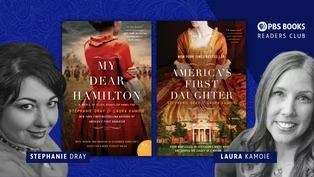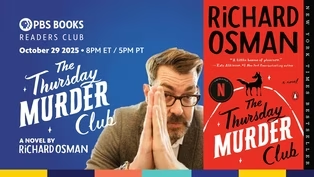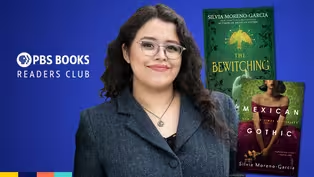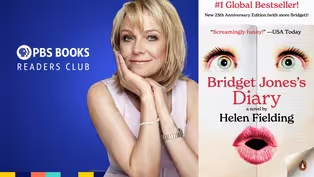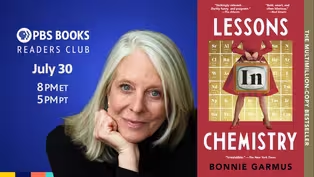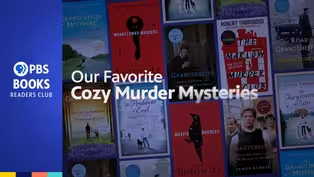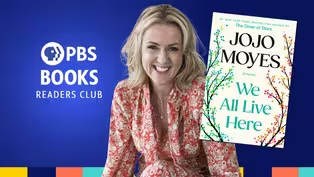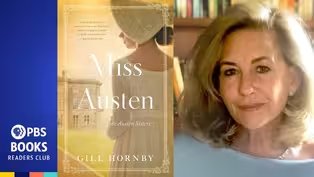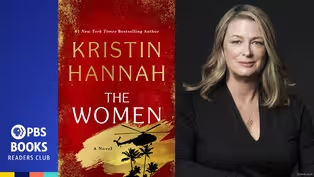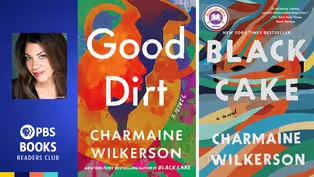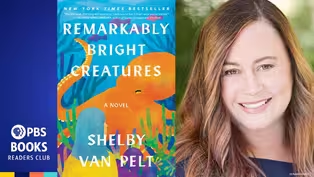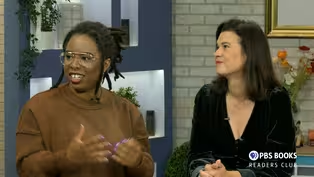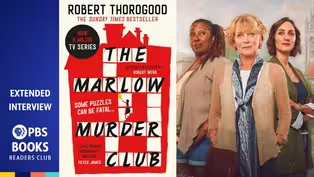
Readers Club | Robert Thorogood
Season 2024 Episode 34 | 58m 33sVideo has Closed Captions
Robert Thorogood discusses The Marlow Murder Club on PBS Books.
Robert Thorogood, author, screenwriter, and producer, joins the PBS Books Readers Club to discuss The Marlow Murder Club, soon a PBS Masterpiece series. The book stars 77-year-old Judith Potts, a crossword setter who, after witnessing a murder, forms the "Marlow Murder Club" with dog-walker Suzie and vicar’s wife Becks to uncover a serial killer.
Problems playing video? | Closed Captioning Feedback
Problems playing video? | Closed Captioning Feedback

Readers Club | Robert Thorogood
Season 2024 Episode 34 | 58m 33sVideo has Closed Captions
Robert Thorogood, author, screenwriter, and producer, joins the PBS Books Readers Club to discuss The Marlow Murder Club, soon a PBS Masterpiece series. The book stars 77-year-old Judith Potts, a crossword setter who, after witnessing a murder, forms the "Marlow Murder Club" with dog-walker Suzie and vicar’s wife Becks to uncover a serial killer.
Problems playing video? | Closed Captioning Feedback
How to Watch PBS Books
PBS Books is available to stream on pbs.org and the free PBS App, available on iPhone, Apple TV, Android TV, Android smartphones, Amazon Fire TV, Amazon Fire Tablet, Roku, Samsung Smart TV, and Vizio.
Providing Support for PBS.org
Learn Moreabout PBS online sponsorshipMore from This Collection
Readers Club | Ep. 211: America's First Daughter | Stephanie Dray & Laura Kamoie
Video has Closed Captions
PBS Books Readers Club welcomes co-authors Stephanie Dray and Laura Kamoie (1h 1m 45s)
Wed Oct 29 2025 | Readers Club | Ep. 210: Richard Osman | Thursday Murder Club
Video has Closed Captions
PBS Books Readers Club welcomes celebrity writer Richard Osman to discuss his best-selling novel (52m 44s)
Readers Club | Ep. 209: Silvia Moreno-Garcia | The Bewitching and Mexican Gothic
Video has Closed Captions
PBS Books Readers Club welcomes award winning author Silvia Moreno-Garcia to discuss her new book. (52m 42s)
Readers Club | Ep. 208: Helen Fielding | Bridget Jones's Diary
Video has Closed Captions
PBS Books Readers Club welcomes beloved British author Helen Fielding to discuss her iconic novel (59m 30s)
Readers Club | Ep. 207: Lessons in Chemistry | Bonnie Garmus
Video has Closed Captions
PBS Books Readers Club welcomes international best-selling author Bonnie Garmus to discuss her novel (49m 3s)
Readers Club | Ep. 206: Our Favorite Cozy Murder Mysteries
Video has Closed Captions
PBS Books Readers Club hosts a special event sharing Our Favorite Cozy Murder Mysteries (52m 32s)
Readers Club | Ep. 205: We All Live Here | Jojo Moyes
Video has Closed Captions
PBS Books Readers Club welcomes international & New York Times best-selling author Jojo Moyes (57m 37s)
Readers Club | Ep. 204: Miss Austen | Gill Hornby
Video has Closed Captions
PBS Books Readers Club welcomes international best-selling author Gill Hornby to discuss her novel (51m 18s)
Readers Club | Ep. 203: The Women by Kristin Hannah
Video has Closed Captions
PBS Books Readers Club welcomes international best-selling author, Kristin Hannah to discuss novel. (53m 29s)
PBS Books Readers Club | Ep. 202: Good Dirt & Black Cake | Charmaine Wilkerson
Video has Closed Captions
PBS Books Readers Club is delighted to welcome critically acclaimed author Charmaine Wilkerson (55m 29s)
PBS Books Readers Club | Episode 201 | Remarkably Bright Creatures | Shelby Van Pelt
Video has Closed Captions
PBS Books Readers Club launches season two with award-winning author Shelby Van Pelt. (57m 40s)
Readers Club | Our Favorite Books of the Year
Video has Closed Captions
PBS Books Readers Club | Our Favorite Books of the Year (51m 53s)
Providing Support for PBS.org
Learn Moreabout PBS online sponsorship(bright orchestral music) - I don't think I've ever killed anybody after the first chapter, 'cause I want a dead body and then I want to start showing people the various clues, the various characters, the various sort of motives, and then to try and surprise people along the way.
So it is supposed to be a rollercoaster ride.
I'm going for a ride.
I want it to be a fun ride.
(bright orchestral music) - Hello and welcome to the PBS Books Readers Club.
Today we'll be joined by Robert Thorogood, the author behind the book series and PBS Masterpiece hit "The Marlow Murder Club."
- "The Marlow Murder Club" follows a charming and unlikely group of women who become amateur sleuths, solving murders together in the English town of Marlow.
- Filled with humor, wit, and just the right amount of suspense, "The Marlow Murder Club" book series has been the inspiration for the Masterpiece mystery series on PBS.
- The series airs Sunday nights on PBS, and PBS members can stream the entire first season on PBS Passport right now.
Just $5 a month makes you a member of your station, giving you access to PBS Passport and the PBS Books mug.
(hosts chuckling softly) - We are so excited to speak with the author, Robert Thorogood, and we'll also reveal our pick for next month's read, so stick around for that.
- I'm Lauren Smith.
Fred Nahhat is away today.
We're sad about that but he'll join us next time.
- So sad.
- Princess Weekes is an award-winning video essayist and author who brings her masters in literary theory to our table.
Thank you for that.
- Yay!
Thank you.
- And Heather-Marie Montilla is our resident librarian, which we definitely need, and she's also the PBS Books National Director.
But of course, you are the most important person in this book club.
As we discuss "The Marlow Murder Club" today, please share your thoughts with us and the other book clubbers in the comments.
Really, it means the world to us.
- [Heather] We love it.
(laughs) - Yes, we love it and we love reading and responding to your comments in the chat, and every time we see a little like or love float by- - Float by.
(all laughing) - -it makes us smile.
It lets us know that you're enjoying the time that you spend with us!
- And speaking of enjoying time in the company of other readers, be sure to join the PBS Books Readers Club Facebook group.
You'll find and share book recommendations and discuss your favorite reads anytime.
- And please share this event.
As we always say, friends do not let friends don't miss out on great books.
- They don't.
- [Princess] And what's better than a book club with great friends?
(all laughing) - Nothing!
It is the best.
So let's talk about "The Marlow Murder Club."
The series follows the adventures of unlikely amateur sleuth Judith Potts, a 77-year-old crossword puzzle setter living happily on her own in the quaint town of Marlow.
One evening while out swimming in the Thames nude, which I love- - Yes.
- -Judith witnesses a brutal murder.
The local police don't believe her story, so she decides to investigate for herself and is soon joined in her quest by Suzie, a salt-of-the-earth dog walker, and Becks, the prim and proper wife of the local vicar.
- Together they are the Marlow Murder Club, and when another body turns up, they realize they have a real-life serial killer on their hands.
- Uh-oh!
- And the puzzle they set out to solve has become a trap from which they might never escape, allegedly.
(Lauren gasps) (Princess laughs) - Book friends, what did you think?
First of all, happy Halloween.
- Happy Halloween.
- Happy Halloween!
- We did it, finally.
- Yes.
- The weather's beautiful.
- Yes, we finally did it, and this was just the right on of spooky I feel like for October.
- Absolutely.
- So what did we think?
- I loved it.
When you start off going nude in the Thames, I'm like, all right, I'm in.
And I just love older-women detective stories.
Like I grew up watching "Murder She Wrote," so this was just a perfect sort of like comfort, scary-cozy read as we- - Scary-cozy read.
- Yeah, absolutely.
- Yes.
- Agreed.
I mean, I think I love how it starts a lot with thinking about women being invisible or not visible and kind of that strand, but then obviously everyone knows I love art, so you have art woven in there, antiques as well.
Fun to see.
And just really, it's clever, it's fun.
You're right, it's the right amount of spooky.
- Yeah.
You know what I liked?
I liked the development of the friendships between Judith- - Yeah!
- Yes.
- -and Suzie and Becks, because you get older, it's hard to make new friends!
So it was great to see like these women from different generations, different ages coming together, making friends, learning how to trust each other.
I really liked that.
- All you need is a dead body.
It's so simple!
- Yes.
(all laughing) - Why have we never thought about that?
That's why true crime's so popular.
You just need one.
- Oh my god.
- Well, and I also like to read the book and then watch the series, right?
- Oh, yes.
- And to see how it was different, how it was the same, how they both on their own are so compelling as works of art.
- Yeah.
- But I definitely, well, I like them both.
I don't know if I can say which one I like better, but I think they both stand on their own and I like them equally.
- That's a great feeling.
- I like that the author, Robert Thorogood, is involved in both the writing.
- Yes!
- He's a producer and a screenwriter- - Works so hard.
- -and an author.
I think that makes it work.
- And he has a background in making shows, so he understands how to translate the dynamics, so I think that's gonna be so interesting.
- Which is why it's so interesting.
Like why did he make some of the choices he made?
- Well, there is a lot to discuss with Robert Thorogood.
He's standing by to join us in just a moment.
And we want to invite you to join the PBS books Readers Club too!
Tell us what you thought about "The Marlow Murder Club" and maybe pose a question or two for your other book Clubber to react to!
Like any good book club, it's more fun when we are all involved, and there are lots of ways to connect, including our e-newsletter.
You'll find exclusive author interviews, book recommendations, and more.
Just visit pbsbooks.org/subscribe to sign up and be sure to follow PBS Books on Facebook and Instagram too and fill up your feed with great books and authors.
And hey, if you are really loving the PBS Books Readers Club, I really hope you'll take a moment to show your support.
PBS stations rely on donations from folks like you and me, and if you'd like to see of the PBS Books Readers Club, here's a great way to help us keep it going!
If you're watching on Facebook or YouTube, just click the link in the comments or description or visit pbsbooks.org/donate.
You'll be taken right to your local PBS station's giving webpage where you can find some PBS Books swag as our thanks for supporting this program.
One of those gifts is an ebook download of "The Marlow Murder Club" or any of our PBS Books features for your phone, tablet, or e-reader.
After you make your donation, you'll receive an email with a link and a special code to download one of our featured books.
Or, this is fun, you can get one of our official PBS Books mugs!
Just $5 a month will get you the PBS Books mug and it makes you a member of your local PBS station, giving you access to all the amazing shows in Passport, including the extended edition of this interview with Robert Thorogood and the full season of "The Marlow Murder Club" Masterpiece series before it even plays out on PBS, so that's really fun.
Everyone's been looking for the mugs.
These are great.
The back says, "My weekend is booked."
I'm not gonna turn it around 'cause there's lipstick on mine.
It's not cute, but yours will be much cuter than that.
So if you wanna see more of the PBS Books Readers Club, we gotta hear from you.
Just click the link in the description or visit pbsbooks.org/donate.
We'll send you a set of the official PBS Books stickers too along with your ebook or mug.
Again, donations support your local PBS station and it will help us keep this book club going for another month.
And now let us welcome our guest, Robert Thorogood.
He's an author, screenwriter, and producer for works like "Death in Paradise," and of course, "The Marlow Murder Club."
Robert, welcome to the PBS Books Readers Club!
- Thank you very much for having me.
It's lovely to be here.
- Yay!
Well, thank you so much for joining us and for "The Marlow Murder Club."
We loved it.
Tell us a little bit about how the idea for this story came to be.
- Okay, well, so about 15 years ago, I came up with the idea for "Death in Paradise."
I was a very unsuccessful writer at the time, (Lauren laughs) but I was obsessed with murder mysteries.
And I'd tried to get a job on "Midsomer Murders," which is a great British show.
- Another PBS favorite.
- Right.
- It's a super show.
It's one of the all-time great shows, "Midsummer Murders," "Jonathan Creek," amazing, amazing shows.
But I couldn't get on it because I was unknown.
I hadn't written anything, so I had to try and come up with something myself and I came up with "Death in Paradise," which was very much sort of, I'm obsessed with Agatha Christie.
I'm obsessed with murder mysteries.
I've always loved Agatha Christie and it was sort of my take on what Hercule Poirot would be in a modern world.
You know an uptight, slightly ludicrous detective.
So I created Richard Poole, but I also, when I was growing up loving Agatha Christie, not just loved Hercule Poirot, but also Miss Marple, and I became increasingly interested in the idea of what would a modern-day Miss Marple look like?
And when I was thinking about it, that's when I started to come up with "The Marlow Murder Club."
- Oh, that's amazing.
We're gonna get into Miss Marple eventually, but you mentioned a little bit about it, but how did your journey as a writer begin and what specifically draws you to the mystery genre?
- Well, what's funny is that I always wanted to be a writer.
I don't know, I think it's true of all writers.
You have this sort of feeling, this sort of, I mean, if I say fire, it seems a bit grand, but there was just a feeling in my soul from very young, like four or five, six years old.
I read books.
I wanted to be the person who wrote the books, but the problem was that I wasn't very clever, so when I was put (hosts laughing) in English set- - I don't believe it.
- No, no, but when I was put in English set, I was put in the C stream.
So you know, the really clever kids were in the A stream.
They were sort of the ones who were going up to the top universities.
And the ones who might aspire to that were B streamers.
I was C Stream.
(all laughing) So I didn't really have the confidence, but I still had this feeling inside me, and it was only when I got to university that I decided that I was old enough, I'm like 19, 20 years old, that I was going to try and do the thing that I'd always wanted to do, which was write.
And the thing is that I've always been, you know, in love with murder mysteries, and the other thing that I was really into, 'cause all the cool boys are into this, is magic tricks.
(hosts laughing) So when I was growing up trying to make up- - It's true.
- -for the fact that I wasn't that popular, I loved magic tricks.
So the thing that made me just attack the genre was Agatha Christie.
The very first Agatha Christie I read was "Peril at End House," and quite clearly here was a writer writing a thrilling story, but also pulling off an amazing magic trick.
So that was specifically within the mystery genre what I really liked, the idea of smuggling a killer past the reader, then revealing it at the end and it being a surprise.
So that was why I spent a lot of my 20s and 30s reading Agatha Christie, feeling that actually I wasn't pursuing my career, but lo and behold, when I eventually got a show off the ground, it was a fair-play murder mystery and my love letter really to Agatha Christie.
- So Robert, writing a story that involves a specific discipline, art dealing in this case, must require a good bit of research.
Did you conduct any specific research for the book, particularly regarding the art, the procedural aspects of the investigation, or the setting of Marlow, and how do you go about doing that?
- Well, I am married to a journalist, and oh gosh, so long ago she said to me that when I need stories, I need to look in the newspapers.
This is when you still bought physical newspapers.
- [Lauren] Yeah.
(laughs) - Now you'd say look online, go to Reddit.
There are so many other places to get your stories now.
So every day I'd buy the "Daily Telegraph" here in the UK and if I found a story that was interesting to do with murder or whatever it was, I'd clip it out with scissors like it was the 1930s or something, and I'd put it in a file.
And in fact, I got the idea for "Death in Paradise" from a clipping.
It's based on a true story.
A cricket coach called Bob Woolmer, a British cricket coach, died in the Caribbean in suspicious circumstances in 2007 and we sent a British copper over to the Caribbean to solve his murder, and I clipped that out thinking, "Hey, there's a TV show in this."
So most of the research I do, most of the things rather that go into my books I've got from clippings.
So in my latest book, "Murder on the Marlow Belle," which is coming out next year in America, one of the motives for the murderer is based on a story that I read in 2018 about a Canadian clarinetist.
I won't say anything more because that would be to spoil it, but in 2018, I bumped into the story, I clip it, and then I save it and then I mull it.
And then every time I'm doing a new story, I go back to all of my clippings.
They're all virtual now.
I use, you know, a notes program online.
And I look at them all and I try and find what are the interesting stories?
So I'm sort of always doing a bit of research at a low level, and then I try and pull it together when I start writing a new story.
- Can we talk about your process in writing a mystery?
Do you always know who gets murdered in the beginning and who done it?
- I always know who done it and I always know how done it and I know why done it.
In fact, I mean, I think I'd never compare myself to Agatha Christie, but I think she started with the end as well.
I start with the end.
Every "Death in Paradise" episode starts with the end.
Every "Marlow Murder Club" book starts with the end.
What's the trick?
Now, I don't think, I don't expect the reader to fail to guess who the killer is.
There's normally only four or five suspects.
But the game, and it is a parlor game, is can I smuggle the killer past you?
Because when you're reading a book and you see the reveal of who the killer is and you didn't see it or you discounted that person long ago, the thrill you get is so intoxicating, And I'm sort of chasing that thrill when I try and write a book.
So you're sort of starting at the end and working backwards through time, creating characters until you get to the beginning, and then you hope that when you then tell the story from the beginning through to the end, it makes sense, which it doesn't always, and then you have to throw it out and start again.
But start with the end, work to the beginning.
It's an insane way to work.
No sensible writer would work like that, but that's how I construct murder mysteries.
- I actually love that.
It reminds me of why I love "Colombo" so much.
Like you already know how done it and you're just gonna like figure out it with the detective.
- The novel balances humor with suspense masterfully.
How do you decide on the tone of the book and what challenges did you face in maintaining that balance throughout the story?
- Well, the question of tone is quite an interesting one, because when we were doing "Death in Paradise," I've done about 100 episodes of "Death in Paradise."
We were quite late into the process, maybe series six or seven, when we realized that in all of our times, all we'd ever done is either knife someone to death or shoot them to death or poison them to death.
And actually, Agatha Christie's quite similar, isn't she?
I mean, she was the queen of poison.
She would often poison you.
And so right from the start, you're trying to choose a murder that...
If I use the word safe, that's obviously ludicrous, but it's not gonna be too gruesome.
It's not going to be too upsetting.
I mean, you know, you can do some quite upsetting things, but it's important to sort of do it from a distance so that you're not too involved.
So by choosing the murder as not being too gruesome, you know, we don't have rotting corpses that often, and if we do, we'll gloss over that.
And then as far as tone goes, I always try and imagine that it's really important that you take the crime seriously.
Like for the dead person and the dead person's family, this is real and it really matters, but the characters who are trying to investigate it in "The Marlow Murder Club" are quite eccentric.
- Yeah.
- So I never write any jokes.
I never write anything to be funny, but because the characters themselves are quite quirky, they might approach it in a quirky way.
So I sort of don't try and write anything that's too funny, but I am always aware that they might have an odd approach that would be sort of quite joyous or silly, but it's through the characters.
It's not because I'm trying to force them into doing things.
And ultimately, it's about trying to keep that Agatha Christie tone where you are saying to the reader, it is not a parlor game, but it is something where I'm saying, "Just watch what's going on.
Follow the ball and see if at the end you can see where the ball is."
And because you are always trying to think, "What do the readers think now?"
It always means that you're trying to be very careful with the tone, because again, if we get too gruesome or too silly or too light, it'll pull you out of the story.
But tone is a hard one, because tone is kind of me.
You know, when we were doing the new series of "The Marlow Murder Club," we've got new writers on it and we're doing original stories, which I find really exciting, taking Judith, Becks, and Suzie and giving them to other writers to write.
And they sort of ask me, you know, sort of what's the tone?
And I'd go, "It's sort of what I would do."
So I'm sort of the only person who can't answer that question, but the tone of the book is kind of what I think a murder mystery should be.
So I do find it a bit difficult to talk about, actually.
- That is so interesting.
- Yeah, for sure.
- Let's talk a little bit more about your quirky characters, because Judith Potts, she's unique.
We love her.
I read someone's comment recently that like, "Judith is who I wanna be when I grow up."
- Yeah.
- I love that phrasing.
How did you go about shaping her character and what aspects of her personality were most important to you?
- Well, the most important thing to me was that she should be happy.
She should live on her own.
She should want for no man.
She should have a job that she loved.
She should live almost most importantly in a massive arts and crafts mansion, because I want to live in a massive arts and crafts mansion.
And I just thought, you know, I mean, this is some years ago now, but I just thought, just with a small P, it would be politically interesting to have a heroine who goes into the story wanting no help from a man, 'cause there are so many stories aren't there, where the man sorts out...
I mean, think of like "Die Hard," to choose a sort of an archetypical example.
The man solves the problem on his own with absolutely no help.
Well, in "Die Hard," he does have the help of the cab driver, the limousine driver, but he's also a man.
But I wanted to do a story where a woman had a problem, which is that her neighbor has just been murdered, the police don't believe it's a murder, and she goes about solving it without help from anyone apart from, because I thought I can't just have one person on their own, a couple of other women.
But that was the thinking behind Judith.
I wanted her to be unapologetic.
I wanted her to be proud of who she was and I wanted her to take no prisoners.
- So the trope of the older female sleuth is so prevalent, from Miss Marple to Jessica Fletcher in like the "Murder She Wrote" series, and to your own Judith Potts.
Why do you think this kind of older detective female character is so compelling to writers, and also readers like yourself?
- I think it's because we've all got a great aunt who'd be a brilliant detective.
I think that's why.
It is though, you know, sadly, and this goes back to why I wanted Judith to be so proud, to wear a cape, to sort of swim naked in the river, to own who she was and her life and everything, is that society says traditionally that the older woman is invisible.
The older woman has nothing to offer.
You know, it's that awful thing, it's that when you know you've stopped having children, if you're so blessed as to have children, society says, "We're not that interested in you."
You know, witches start happening beyond childbearing age.
So what I wanted was I just wanted to say, "Here's somebody whose society doesn't notice."
Miss Marple is not noticed for a similar reason, because she's just a spinster aunt who lives on her own in St. Mary Mead.
And just that idea, I mean, going back to Hercule Poirot when...
In my head, everything is Agatha Christie.
So going back to Hercule Poirot, he was also underestimated, 'cause he was a foreigner.
He looked a bit silly.
He talked funny.
He was a little pompous.
He had a stupid mustache.
But again, underestimate your hero and then you get an interesting dynamic, and no one underestimate someone more than an older woman who lives on her own.
- So mystery novels, they often hinge on subtle details.
How do you ensure that these details are both hidden in plain sight so that readers can engage with the puzzle, but then are still surprised by the resolution?
- This speaks to the fair-playness of stories.
I obsessively do fair-play mysteries.
I get slightly upset when I read a murder mystery where in the revelation at the end, they mention something that I didn't as a reader know or that I didn't as a viewer know.
So you're right, I try really hard and work very, very hard at trying to smuggle in the important clues.
I'll give two examples, 'cause one is from books and one is from telly.
One thing I noticed that Agatha Christie does, which she's really good at, she'll take two facts that put together obviously reveal who the killer is, just two simple little things.
Like it might be a champagne bottle and a cork.
You know, just two little things.
The thing about a book is it takes ages to read.
I mean, there's nothing worse than publishing a book and within three hours, you start getting reviews on Amazon.
That's demoralizing.
(hosts laughing) But normally it takes ages to read, and so what she does is she'll put the champagne bottle early in the story and the cork late in the story, and so by separating, by trying to get the clues apart from each other, that's quite a clever way of trying to hide a clue.
And in the TV show, what I realized is quite a smart thing to do is to put the important clue in before the murder, 'cause in a funny sort of way, 'cause we all know it's a parlor game, 'cause we know that we're trying to solve the killer, find out who the killer is, you kinda...
I don't 100% start paying attention until we have a dead body.
So smuggling something in before the killing happens, that could be another way of doing it, but I'm constantly looking for ways to try and fairly hide information.
And when I read other murder mysteries and they do it, it's so satisfying.
It's the best feeling, 'cause that's the magic trick, when you show someone, say three cards.
You asked them to guess the three cards and it was none of them and you realize, ah, there was a fourth card all along and I did know that, but they'd hidden it or I'd forgotten it.
- Right.
- So that's kind of what I do, but for me, it's magic.
When I wrote Judith, this woman who lived on her own, she's obviously my grandmother, my great aunts, my mom, all of these people, but I also wanted her to be a crossword setter and I wanted her to have certain attitudes, and so I bleed into that character.
I mean, it's obviously, it's me because it's my imagination, but I bled into that a lot.
And something that I have found nice... A terrible word.
No writer should use the word nice, but here we go.
Something I have found gratifying, pleasing, is I've had some women come up to me who live on their own and they've said how lovely it is to read a story about a woman who lives on her own and is happy living her own, and when the doorbell rings, she doesn't want to answer it.
(Lauren chuckles) So that's quite nice.
That's okay.
- I mean, that's aspirational for me, for sure.
- Yeah, same.
- I hate opening my door.
(Princess laughs) What has kept you returning to the series?
'Cause you mentioned at first it started off as just being a book and now it has become this series.
What has kept you returning to it, besides all your little cutouts (laughs) and these characters?
- It's because, well, the first book is basically, you know what it's like with telly.
It's the same with the book.
It's kind of a pilot episode.
So the first book I wanted there to be three murders, 'cause there are three heroes.
We've got Judith, and then during the course of the murder investigation, she meets a dog walker called Suzie and she meets the vicar's wife called Becks.
And so that was gonna be three murders, and we have to introduce who they are and how they live and what's their family set up.
So that's book one.
And then book two, I'm going, right, they now know each other, so what would a murder mystery for them look like?
And I also, Agatha Christie again, it's always Agatha Christie, I wanted to do a country house murder.
Good thing about Marlow is that yes, you've got the pretty high street, but there's also some celebrities who live in big houses nearby, so I thought, let's go to a big house and let's do a country house murder.
And where are the relationships of the characters now?
And so with each book, as you move the characters on, or if you imagine like a diamond, I always try and imagine sort of turning it and then looking at a different facet of their relationships.
And the stories change them.
That's the other thing when you're writing a book which is so enjoyable, you set out telling a story.
So in the second book, it's about this big country house and this horrible family who lived there.
Obviously they're horrible.
They're super posh, very horrible.
That's a rule, I think.
Posh, horrible.
(Lauren laughs) And through that story, the character starts speaking to me, 'cause that's the weird thing.
- Yeah.
- The characters speak to you.
You're sort of at times taking dictation.
So for example, a really good example of that is Suzie who, I mean, I adore all of the characters, but Suzie has a tendency to take over scenes.
So she talks and talks and talks, and so I have to control her.
I'm taking dictation from these three imaginary characters in my head.
It's all perfectly sane.
And I have to keep Suzie a bit quiet to make sure she doesn't take over.
And so each story changes the characters and their relationship, and so then when I went into book three, it's like, oh, now where are they now?
So I'm excited to find out what the women are up to and what their families are up to.
And now that I've done book four, I am going to address Judith's backstory completely in book five- - Ooh, okay.
- -because I set up in the first book that...
I've got a five-book deal.
I don't wanna leave things, you know, incomplete.
Who knows where we're gonna be for the sixth book, so I want to finish Judith's story, because as well as me saying how I wanted her to be independent and to not want for any man and all of these things, she also has quite a dark past, so I'm gonna tell the rest of that story in book five.
So that's what- - Please send it along when you're done.
- -keeps me returning.
- Actually, I've only got another 79,999 words to write.
It's fine.
It won't be too long at all.
- It's fine, two weeks.
- It's so fine.
- You got this.
You've got this.
- Yeah.
- Suzie's like when that sixth book comes and she's like, it's my turn to be- - Right?
(all laughing) She wants to be the focus.
- Yeah, yeah, yeah.
- Suzie investigates.
- Exactly.
(laughs) - So we've talked a lot about Judith, we've talked a lot about Suzie.
I wanna talk about Becks, right?
So for me, Becks, obviously, and I'm not married to a vicar, but the fact she is married to a vicar and in a lot of ways she's like this suburban mom, I would say, right?
She's a country mom.
But she feels underappreciated, and she's a rule follower.
I'm a librarian.
I think it's pretty clear I'm a rule follower.
(Heather laughs) So I really wanna talk a little bit about her development and your inspiration, because her character, it resonated with me.
I really enjoyed her development and I wanna know more about her.
- Okay, so I also love Becks.
Everything in England is class, right?
So Judith is basically posh.
I mean, if we're gonna just sort of broad brush strokes- - Yeah, the Spice Girls.
- -she's sort of posh.
Okay, so it's posh, sporty, and what's the other class?
Yeah, so she comes from a background of privilege.
She went to Oxford University.
She's super clever.
She in a different world would've been a don at Oxford.
She'd have taught, been a tutor at Oxford.
And it was interesting talking about changes that we made for the TV show.
In the TV show we've made her an archeologist, as well as her setting crosswords, but then we wanted something for her to do.
And TV, its action is character, so we make her an archeologist, 'cause that's something for, you know, her to do.
But she comes from quite a posh background, while also being invisible.
But I also wanted the other two leads to be also slightly invisible.
Basically they are not normally allowed to lead a book, a TV show.
And so just to quickly do Suzie, Suzie's a single mom who's brilliant.
And when I was, Katie and I have got two kids and when you're at the school gates and you just, we have friends who are single moms.
There's always single moms.
Don't know any single dads.
That's not a coincidence.
And these women are amazing.
They hold down a job.
They raise their kids.
They get them to school on time wearing the right clothes.
They remember to give them a pound on dress-up day.
They turn up to the parents meetings.
And so I wanted to say, you know, they're also exhausted, absolutely exhausted, so I thought, this is somebody who society, again, doesn't particularly rate, and yet is raising the next generation.
Not only doing that, but doing it on their own.
Anyone who's a parent knows how hard it is.
I can't imagine how hard it is to do it on your own.
So I wanted Susan to be a hero with this story, 'cause I wanted her to have the chance to solve crimes and catch killers, 'cause normally, single mom's not allowed to do that.
And she's more working class.
Now Becks, now I have to be careful with Becks, because I am myself quite middle... Not quite.
I'm the very embodiment of middle class.
I am middle class.
I have the same sort of worries as Becks.
My wife, to a certain extent, has some of the worries of Becks.
And the problem with the middle class is you're worried.
The whole time you're jostling, aren't you?
How can I maintain my position?
How can I demonstrate I've got the right colored paint or the wallpaper or wearing this season's shoes?
And so again, thinking of invisible women who don't normally get to lead detective shows, a housewife, you're not even defined in your own term.
You're the wife of the house.
The vicar's wife, you're the wife of the vicar.
You know, a mom.
You're the parent of these children.
She was defined by what she wasn't, by these other people, and I thought it would be exciting and fun to take someone who was very rule bound.
She could've been a librarian.
Librarians are the heroes of the world, as we know.
And what happens when you've got this very, very fussy, worried middle class person suddenly solving crimes with a posh person who does not care what people think about her, and Suzie, who also doesn't care what people think about her?
So that dynamic I find really exciting and fun.
And my sympathies are always with Becks, but it is also possible to laugh.
I laugh at myself for being a neurotic, lunatic, middle-class fool.
You know, before this interview I was ironing this shirt.
There was a crease just here, two little creases, so now I've got out the iron.
- It's nicely ironed.
It's nicely ironed.
- Thank you.
It's kind of you to say, but it's ridiculous, isn't it?
I'm a writer!
It doesn't matter that I've got a crease here.
It's like, oh god, what will they think?
What will they think of me?
Why should I care?
So that's the middle classes.
And so my sympathies are with Becks, but I do also...
I laugh with Becks.
I don't laugh at, but there's quite a bit of laughter there.
- We really like you, by the way.
- Yeah.
- That's right.
- You can feel good.
- I'll make sure I'm trim.
- Yes.
Very, very sharp.
(laughs) Why do you think that the best mysteries and mystery writers tend to be British?
Because it's definitely very English.
I think of all the detective stories I grew up reading, most of them were British.
That's what I grew up watching.
And we have Colombo.
We have that.
- We have Columbo.
- Yeah, you have Columbo, although Colombo's a how-catch-em rather than- - [Princess] Yes.
- -a whodunit, isn't it?
- [Princess] Yeah.
The reason I think that the British, or the English, is it's not even British, is it?
- Yeah, it's mostly English.
- It's English.
- Yeah.
- It's England.
And it goes back to what I was saying before.
It's kind of class.
Because Agatha Christie was at the forefront of this, I mean, there are two types of murder mystery readers, I sort of think.
There are the ones who are obsessed with Sherlock Holmes and the ones who are obsessed with Agatha Christie.
I'm not interested in Sherlock Holmes.
I find him boorish and and irritating and I don't like him at all, and the mysteries aren't that good.
(hosts chuckling) There we are.
So I've been taken doubt- - That's the sound bite.
That's the sound bite for this entire interview.
- Yeah, yeah, yeah, yeah, yeah.
- We're gonna make sure.
- I think Arthur Conan Doyle will survive my opinion.
That's just a personal preference.
So sort of the genre itself was born out of sort of stories set in England, but I do think it's to do with class.
I do think that the thing that England has always had and we still have, you know, we had Boris Johnson as a prime minister for so long whose claim to greatness was that he was very posh and wealthy and came from privilege, and the country votes for that.
We have a monarch.
So because we have this history and this sense of you know your place, the thing about murder mysteries that make them so exciting is when you go into a world, and this happens with every murder mystery, you see it on the surface and you go, "Oh, it's about a rowing club, or it's about a baseball team," and then when you peel away the layers of the onion, as it were... Oh, I'm getting into a bad metaphor, but when you peel away the layers, you realize that actually all of these people are horrible because they all need to have motives to commit murder.
And there is nothing more delicious than taking a load of upper-class English people, showing the wealth, the houses, the cars that they drive, the lives that they have, and then going, "Actually they're just as black-hearted and murderous as the rest of us."
So I think that's why the English have a little advantage when it comes to murder mysteries.
One, 'cause we kind of invented it, to a certain extent, and Dorothy L. says...
It's always women.
That's what I find interesting.
It takes women to write good murder mysteries.
You know, we invented it, but also we've still got the sort of whiff of that world still in the country, and therefore it kinda still works here.
- Absolutely, and Doyle hated Sherlock Holmes by the end of it anyway, 'cause he's the one who killed him off.
- He did, bless him.
Yeah, yeah, yeah, that understandable.
- So he's on your side.
So you have this amazing background in screenwriting and television and it shows in how snappy the dialogue is, the really good pacing.
Like this is a really well-paced novel and series of mysteries.
- I agree.
- It's really great.
What were some of the things that was sort of like growing pains or changes of going from novel to screenplay and back and forth and working on those two different mediums?
- It's interesting that there are similarities.
Dialogue.
So when you're a screenwriter, you're really trained in dialogue, and it's a two-way process, because on the one hand, you write it, and on the other hand, you see actors perform it, so you really learn and you hone your dialogue.
Look, I'm English.
I just totally froze at the idea of saying anything complimentary about myself.
Hold on.
(hosts laughing) I think I'm quite good at dialogue.
Right, I'm owning that.
- You are - Good, own it.
- Thank you.
No, no.
I think you'll find I'm terrible.
No, I can say it, but if you say it, then I have to then say, "No, I'm not."
Oh god, it's so- - That's so funny.
- See, this is why we have murder mysteries set in England.
'cause we're so equivocal.
We can't say what we mean.
So I've worked hard at dialogue over the years.
What's really (laughs) hard when you go to writing books is obviously you've gotta describe what everything looks like.
- I know.
- In a screenplay, I mean, you'll know this.
In a screenplay, you'll just sort of say, "INT," interior, that is, "INT police station day.
Richard Poole walks in in a bad mood."
I mean, that's not good writing, but you don't describe the windows or what the weather is like.
And so you're sitting there, or at least I'm sitting there and I realize I don't actually have the tools for describing these things.
I haven't been trained in how to describe them, and it is very hard.
I find those descriptive parts of the story a real... Well, I write to learn how to write and it's something that I've really enjoyed getting better at or learning how to do and trying to develop brevity.
I mean, when I talk, I don't.
I can't stop talking.
(Lauren laughs) But when I write, I'm trying to develop brevity.
But again, what's lovely about the books which you don't get with the TV show is you get the interior life of the character.
- Right.
- So I can, you know, when you're writing a scene for a TV show, you know exactly what every actor is thinking or the character is thinking, but you don't know on the day if the actor's gonna do it, and they often do, 'cause actors are amazing, and sometimes they don't, but in a book, you can describe exactly what the character's thinking, how they feel about something, their nervousness or their confidence in what they're saying, and that I find absolutely joyous, because that feels like magic.
You write the dialogue, but you also describe the feelings of the person who's saying it.
So writing books, it's a very different challenge in many respects.
Technically, it's always the same.
It's just storytelling, isn't it?
But I've enjoyed learning about the extra bits of writing for books.
And you don't have a budget, you know, as I was saying earlier.
What's lovely is that, you know, if I want Judith to live in an arts and crafts mansion, which is a beautiful wooden building, they're built around the country in the 1920s by any three or four architects, I don't have to worry if we can afford to buy it or build it.
I just write it and she's got it.
And when we did the TV show, I was thrilled, because they actually found one.
So you know, there is joy to be had in the freedom that you get in books, but also it's a lot of words.
It's a lot of words!
As anyone who knows who's tried to write a book in particular, it's a lot of words, and that can be overwhelming, so you just have to sort of (inhales) just try and write one word at a time and not get too stressed.
- Well, let's talk a little bit more about the television series, or you said telly.
I like that.
Telly is much is much cuter than TV.
- Oh, is telly colloquial?
Yeah, yeah, telly.
Okay.
- It's much cuter than TV.
So what was it like seeing "The Marlow Murder Club" adapted for television?
Were there any like challenges or surprises in translating the story from page to screen and how involved were you in that process?
- I was super involved and it was wondrous.
It's just amazing.
What I find...
Right, so the people who make this show are phenomenal.
The heads of department.
Sure, there's a book to work from.
I do get that, but truth is that I've got a very specific idea of what Judith's bedroom looks like.
It's described...
I went back, actually.
I hadn't been on set.
I went back and had a look at the description, and there is a description there, but when I walked into her bedroom, I think I said it's oak paneled.
She's in a four-poster bed.
The designer had put the exact green velvet sort of duvet cover.
It's not a duvet cover, it's sort of... My great aunt had them.
They're sort of satiny things over the bed.
They had exactly the right china.
When I was growing up, I was really taken by, there's a design by Minton who's a local, not local, but local to the UK, pottery, and it's called pink cockatrice, and there's another version called green cockatrice.
They're the beautiful little birds on china for teacups and saucers.
And it's in the show!
And it was as though everyone involved in it had taken what was in my head... Do you remember Dumbledore with his pensive?
- Yeah.
- How he would take the ideas out of you then show you what had actually happened?
That's what it felt like.
It was genuinely, the amount of times I'd be on set and I'd get goosebumps looking at how they had literally built what I thought was only in my imagination.
So the first rule is when you're trying to make TV, that was my experience.
It was amazing.
It was a busman's holiday.
I mean, it's worked, 'cause everything is hard, writing is hard, but come on.
It was so much fun.
- Okay, Robert, I want to turn the tables a little bit now and give you a chance to learn something about your readers, if you've ever been curious.
If you've ever wondered what your readers think about you or your books or their reading experience, now is your chance.
Could be a general question or you wanna know their thoughts about this book specifically.
So Robert, do you have any questions for your readers?
- Do I have any questions for my readers?
Yes, as per my previous answer, it just strikes fear into my heart.
(hosts chuckling) So the thing that I do like to find out from readers though is what are their favorite murder mysteries?
Fair-play murder mysteries, because that I find really interesting, 'cause I'm always looking for new fair-play murder mysteries, and they can be in the oddest place.
I remember 100 years ago reading "The Bone Collector" by Jeffrey Deaver- - Oh, yeah.
- -which I thought when I was reading it was a chilling, dark, nasty story about someone who collects bones.
And it's all of the above, but it's also a fair-play murder mystery.
So it's not just in the cozy genre where you can find it.
So if I'm remember talking to readers, that's what I always want to know is what particularly good murder mysteries have they read so that I can read and learn to be a better writer myself.
- Oh, that's a great question, so please, readers, put your responses in the comments.
We wanna see them and we'll make sure that Robert gets them.
- Robert, it has been so illuminating to discuss "The Marlow Murder Club" with you, so thank you so much for this.
This has been wonderful.
I wanna go and read my Agatha Christies right now, 'cause I have them on my Kindle.
What do you hope people experience in reading your books?
- Joy.
I want them to be entertaining.
Above all else, I want them to be fun, entertaining, easy to read.
I want them to find the story gripping.
I want them to play the game.
I kill people quickly.
As far as I'm concerned, like proper writers, they'll build up characters and milieu and mood and tone and all these things.
You could be 100 pages in and then they kill the person.
But I don't think I've ever killed anybody after the first chapter, 'cause I want a dead body and then I want to start showing people the various clues, the various characters, the various sort of motives, and then to try and surprise people along the way.
So it is supposed to be a rollercoaster ride.
I'm going for a ride.
I want it to be a fun ride.
And there's the moment when, and I always put it in my books, in "Death in Paradise," in the TV show, where the detective has solved it and the reader is told, "Ah, Judith knows who the killer is," and you should be able to close the book at that point and you should be able to take a guess.
And then when the killer is revealed, there'll be no information that you didn't already know.
So that's the game.
The game, if you're prepared to play it, is can you work out who killed them?
- We know you loved to read when you were a kid and you liked magic.
Did you know that you wanted to be a writer as a child, or did that realization come later?
- Always, always.
Gosh, I was quite a precocious reader and I remember reading Robert Ludlum, "The Holcroft Covenant."
He's a British thriller writer from the 1970s.
And when I went into school one day, I had to write a story and I decided that I would retell it.
So I went, "Chapter one," and I was only like six or seven years old.
So writing is really an illness, I think.
It's a condition from which you don't survive or recover.
So it was always in me, I just had to develop... Also, I'm a man.
There aren't many things that I had to say about the world that was of any interest until I was about 30 something, so I had to wait until I'd matured enough and had something to say before anyone wanted to pay me to say anything.
But yeah, it's an illness I've always had, a condition.
(Lauren laughs) - Well, I'm glad you're making money from your condition now.
If you got one, you might- - Not as much as I am and not as much as my father-in-law is.
Not as much as my kids are and the fact that they can wear shoes.
So yeah, I'm also glad!
(hosts laughing) - What's your ideal writing setup?
Are you a morning person, a night owl, or do you like to work in an office, a coffee shop?
Do you mix it up?
- I panic every day when I get up.
You know the White Rabbit at the beginning of "Alice in Wonderland?"
- Yeah.
- That's me.
"I'm late, I'm late."
I feel I'm late the whole time.
So I get up super early, it's like about half five or six, and I don't set an alarm.
It's just my brain is going, "Oh my god, what if today's the day I can't write?"
And my feeling is, and this is just past the madness of being me, it's that you kinda start work at 9:00 a.m., so I try and start work at half seven or 8:00, because no one would expect me to write any words then.
So if I've started well before 9:00, then when 9:00 ticks over, I'll go, "Huh, I've already been writing.
I'm fine."
And then I can flow and get through the day.
If I haven't written a word by nine o'clock, I cannot write a word for the rest of the day.
- Aw.
- So I have to write.
- You're very self-aware.
- It's insane.
- Yeah.
- Well, you do it.
I've been writing in a small office for 15 years.
You learn what works and what doesn't, and I do know, 9:01, if I haven't written a single word, I cannot.
I'm now frozen in fear that today was the day, whereas if I start at half seven and I go, "Oh, I'll just start, it's fine."
And you know maybe start at 8:00 or maybe start at half eight, by 9:00, the guillotine comes down.
- Mm-hmm.
- So that's my madness that I have to contend with, and so do my family.
(hosts chuckling) - I'm sure they find a way to make it work.
When it comes to reading, are you physical book, e-reader, audiobook, or some mixture of multiple mediums?
- Ah, I was thinking about it only today.
It's a great sadness to me to say that I'm book by choice, e-reader by necessity.
- Mm-hmm.
- My eyes, I can't read the text anymore in a book and I have to wear reading glasses in bed, and then you're lying in bed on your side and you've got your book and you've got your glasses and it's all sort of hard, whereas with the Kindle, I started off on size-five font and I'm now size seven, going on eight.
But what I do do is I'll buy an e-reader book, and if I like it, I then buy the physical book as well and put it on my shelf, 'cause my idea of a book is something that you have read and it lives on a shelf and you look at it and go, "Ah, yes.
I remember loving that book."
And the problem with any kind of e-reader is the books are lost forever.
It's just on a little flash drive at the heart of this little piece of plastic.
I want them to be physical objects.
So it's really expensive.
(laughs) The good books I buy twice.
- No, yeah, I'm the same way.
I'll definitely buy a book three times if I really like it.
(chuckles) - Yeah, I agree.
- Yeah.
- What is your favorite childhood book?
- Oh, "Fantastic Mr. Fox" by Roald Dahl.
- Aw.
- There we are.
It's obvious.
It's obvious!
And it was the first book I read in one sitting.
It's a thriller, isn't it?
It's a revenge story.
It's "The Count of Monte Cristo" but for tiny children and foxes instead of French noblemen.
I love that story.
I love that story.
So yes, that would be my number one.
- [Lauren] Great answer.
- Amazing, yeah.
Favorite books you've read in the last year?
- Ooh, I'm cross, actually.
I'm reading one at the moment.
I haven't quite finished it.
It's only just been published.
"The Examiner" by Janice Hallett.
Now, Janice Hallett is an English writer.
Absolutely brilliant.
I really recommend you go and buy her books.
This, right, remember when I was saying earlier on, the challenge of writing a book is you have to describe things.
You've got the interior monologue.
There's quite a lot of words that you have to write.
It is a murder mystery done through text messages and text messages only and it is amazing the way she just through the texts, so basically dialogue in effect, just through the texts between these various characters, she conjures character, she conjures mood.
There's irony, there's tension.
It's an absolute tour de force, a masterclass in writing, and that has been amazing.
But I can't stop with one book.
In fact, I could do too many, but I finally got 'round to reading, and to my shame, it's taken this long.
It's another murder mystery story sort of is "Where the Crawdads Sing."
- Oh.
- Oh, yeah.
- Which I cannot get over how good that was.
The evocation of the countryside, the fact that I cared so much.
It's interesting, it's one of those stories where the murder mystery is a bit of a MacGuffin, really.
You think it's gonna be really important, and it does resolve and you do find out the answer, but it is kind of the answer you thought was always going to be the case, and that is one of the most beautiful books I've ever read.
And like all really good books, there is no way on God's Earth I'm going to watch the TV show of it or the film of it, because my version in my head is the only perfect version, and I will reread the book many, many times, but I won't see somebody else's version of it.
- Fair enough.
- Mm-hmm.
- What's the best advice you've ever received about writing or otherwise?
- The best advice for writing, I don't know, is to believe that you're good enough, which is, again, quite a serious answer, isn't it?
I doubted myself enormously and I really didn't think I could be good enough.
And really, the process of writing is...
Writing well is a byproduct of writing at all, so just believing in yourself and just write something.
And we're so sort of results-oriented, aren't we?
We think you have to be published or you have to, I don't know, win awards or you have to earn money from it, and actually, truthfully, writing is its own reward, trying to discover who you are through what you write.
And that is quite freeing, which is partly why I struggle when I think of what readers think of the books, because I'm not writing for myself.
I'm writing for readers, but I'm writing to become a better writer.
I'm writing to try and learn what I think about the world, although having said that, there is a kind of a saying that writers write the same story over and over again, and I do notice now, as I've written eight novels, they always have a happy ending.
There are certain things that seem to happen in all of my books.
So yes, believe in yourself and write.
The journey is the destination.
- So beautiful.
- I love it.
- Yeah.
- Finally, Robert, is there anything that you'd like to say to your readers?
- Oh, just that I'm humbled.
I mean, it sounds, oh gosh, again, I can't do this.
(hosts laughing) I'm so grateful that readers have responded to the characters.
I'm so grateful that readers buy the books, 'cause it allows me to continue writing the books.
I am thrilled that I get the chance to do this and that it is a conversation with readers.
You know, readers come up to me at book events, they'll talk about the books, give me ideas.
So yes, I love talking to readers about the world of "The Marlow Murder Club," but I'm a bit embarrassed when any kind of praise, so I like to talk about the characters and how, 'cause I like them too.
That's the thing.
You know, I feel that they're my friends.
I want to be Judith when I grow up.
There we are.
I can end with that.
- Yes.
- We all want to be Judith when we grow up.
- Yes, we do.
- Absolutely.
- Robert, thank you so much for joining us.
This has been absolutely delightful.
- Truly, thank you.
- It's been wonderful.
Thank you for having me on the show.
- Well, that was fantastic.
- Yeah, what a great conversation.
Like it was so good hearing him answer your questions about like his process and the transition from book series to TV show.
It was really well done.
- I love to be able to learn from writers who are both screenwriters and authors and to really understand their process and how they make their art inspired by one another, but they both stand alone.
I also love learning more about the characters and the development of these amazing women.
Different ages, but all middle age to older age, right?
- Makes me look forward- - It's inspiring.
- -to the future.
- Absolutely.
- Yes, for sure.
(hosts laughing) - [Princess] As you've heard in this conversation, "The Marlow Murder Club" is a novel about storytelling that reads like an instant classic.
If you haven't yet, you can pick up copies at your local library or bookstore or download the ebook when you support your local PBS station.
- [Lauren] We're going to reveal our next PBS Books Readers Club in just a moment, but first, remember that as a member of your local station, you'll also get access to PBS Passport where you can stream amazing PBS shows, including Masterpiece "The Marlow Murder Club."
Samantha Bond, who you'll recognize from "Downton Abbey," takes the lead as Judith Potts.
Let's take a quick peek to see how Judith and her friends all come to life on screen.
(tense orchestral music) - [Stefan] Get away!
Dear god, no!
(gunshot bangs) - It's my neighbor.
I think someone's just shot him.
(tense orchestral music) Judith Potts.
- Suzie Harris.
- I'm Becks Starling.
I'm the vicar's wife.
- I'm trying to find out who killed my neighbor.
- [Natalie] Mrs. Potts, there are no hitmen operating in Marlow.
- Ma'am, there's been another shooting in Marlow.
- [Man] And you've decided to have a little poke around.
- We're not going to stop investigating, are we?
- Are you at the rowing center?
- The reception's very bad.
You're breaking up.
- You haven't turned the phone off, Judith.
- Step up- - You didn't turn it off!
(dramatic orchestral music) - Every time I see you, there are more of you.
- And we are even more successful.
(Becks giggles) - Up top.
- You couldn't have just started a book club, could you?
(women chuckling) (plucking orchestral music) - This special adaptation of Robert Thorogood's novel "The Marlow Murder Club" airs Sunday nights on PBS, and it's also available to stream on PBS Passport.
The whole series is there now.
Just $5 a month makes you a member of your local PBS station, giving you access to full seasons of Masterpiece in Passport, and you can also access the extended edition of this interview with Robert Thorogood and other episodes of the PBS Books Readers Club.
And hey, get yourself the PBS Books mug!
"My weekend is booked."
How cute is that?
Or with a sustaining gift of $10 monthly, you can download your ebook of "The Marlow Murder Club" or any of our featured reads.
Just click the link in the description or visit pbsbooks.org/donate and you'll be taken right to your local PBS station's giving page.
After you complete your donation, you'll get an email from your station with a special code to download your ebook.
Now, every station's donation page is a little different, so you might need to search a little bit to find the PBS Books gifts, but stick with us, because your support makes this readers club possible.
- Absolutely, and everyone can help by sharing this video, leaving us a comment, a like, or a love, and if you're watching this on YouTube, be sure to subscribe!
Truly, your comments, shares, and participation mean the world to us, so thank you so much.
- And now it's time to reveal our PBS Books Readers Club selection for next month.
Heather, will you do the honors today?
- I'd love to do the honors.
Our next pick is "Leonardo da Vinci," the number one New York Times bestselling biography from Walter Isaacson that brings Leonardo da Vinci to life.
Read along with us just in time to watch "Leonardo da Vinci," a new two-part documentary directed by Ken Burns, Sarah Burns, and David McMahon that will air November 18th and 19th on PBS.
"Leonardo da Vinci" looks at how the artist influenced and inspired future generations and it finds his soaring imagination and profound intellect the foundation for a conversation we're still having today: What is our relationship with nature and what does it mean to be human?
- [Princess] Yeah, I just love it when we can pair an amazing PBS show with a great book, don't you guys?
- [Lauren] I really do!
- Agreed.
- Like it's always so fun to dive even deeper into our favorite subject.
And like, it's Ken Burns.
How could you go wrong?
- How could you go wrong?
And we hope to see you at our next PBS Books Readers Club event.
RSVP to our Facebook Live event with bestselling author Walter Isaacson, or subscribe to our YouTube channel so you can catch the episode there.
- Okay, book clubbers.
It's time to get reading.
Be sure to go RSVP on the PBS Books Facebook page for our next event with the great Walter Isaacson.
Go do that right now.
- Right now, right now!
- Right now.
- We'll also have more book recommendations in the PBS Books e-newsletters, so don't forget to visit pbsbooks.org/subscribe.
- We are so glad to have you as part of the PBS Books Readers Club.
If you love this conversation, please consider making a donation to your local PBS station so we can keep our book club going.
Click the link in the description or visit pbsbooks.org/donate.
Remember, you can get your very own PBS Books mug along with the removable PBS Books stickers for your laptop, phone, or wherever you'd like to show off your love for books and for PBS, and you can also get that ebook download of one of our PBS features.
We do have "The Marlow Murder Club" and "Leonardo da Vinci" ebooks available, so if you make your donation right now, you can go download it as soon as you get that email with your special code.
- And everyone can help by sharing this video with all your friends!
- Yes!
- Giving us a love or a like and subscribing to the PBS Books e-newsletter at pbsbooks.org/subscribe.
- Thanks for reading along with the PBS Books Readers Club.
(bright orchestral music)
Extended Readers Club | Robert Thorogood
Video has Closed Captions
Clip: S2024 Ep34 | 1h 22m 30s | Robert Thorogood discusses The Marlow Murder Club on PBS Books. (1h 22m 30s)
Providing Support for PBS.org
Learn Moreabout PBS online sponsorshipSupport for PBS provided by:
